Prof. Dr. Biprajit Sarkar
Field of Inorganic Chemistry
What have you done in your professional life so far?
I have built up a research group and have had the pleasure of supervising a series of excellent students and lovely human beings. I have taught several basic and advanced courses across different Universities in Germany and elsewhere. Over the years we have developed several interesting compounds that are electronically ambivalent and have applications in optoelectrectronic and magnetic switching, as electrocatalysts and as reagents for biorthogonal chemistry.
What appeals to you about your new position?
I feel lucky to be part of an institute in which the colleagues are very helpful, and everyone is willing to work as a team. Additionally, for someone of my background, it is extremely important that the Freie Universität is a place in which diversity and internationalization play a very important role.
What do you love about your job?
To be able to interact with bright and young minds, and (hopefully!) be able to shape their professional future to an extent. Also, the unique ability of synthetic chemists like us to create something that did not exist before!
Which task could you gladly do without in your job, but of course you always do it conscientiously?
The ever-increasing bureaucratic hurdles at Universities in this country. Additionally, also hours of completely useless discussions that I sometimes have to engage in without coming to any constructive solutions.
What life hack or insight has influenced your teaching?
The unique ability of one of my high school teachers to catch the attention of his class by bringing anecdotes from everyday life!
How can your research be applied?
Even though we do basic research, we hope to provide insights that will be useful for electrocatalysis for energy solutions, and development of biorthogonal reagents. Additionally, we hope to provide materials for the next generation data storage devices and for quantum computers.
What should people know about your personal life?
I am a very good cook, can play an Indian percussion instrument (Tabla!), and am a decent singer of Assamese, Bengali and Hindi songs. I can speak 6 (+1) languages, and I never seem to be able to make-up my mind between the cities of Berlin and Stuttgart!
What formative experience did you have with nature/science as a child?
Growing up in a family that ran a bakery at a small town in India was a unique first-hand experience into applications of science for preparing tasty food! The people working at that bakery gave me unique insights into the workings of nature, which I could never have gotten otherwise.
What person or personality has influenced you, how and why?
There are many: My high-school teachers Satyen Das and B. R. Chakravorty for their ability to ignite my imagination, and for making me believe that I could achieve anything if I put in the time and the right effort. My professors R. N. Maini and G. K. Lahiri for making sure I never lost interest in chemistry. My immediate family for teaching me the value of hard-work, perseverance, and simple living. In terms of personalities in chemistry: Alfred Werner, Linus Pauling and R. B. Woodward for their insights respectively into coordination chemistry, chemical bonding and synthesis.
